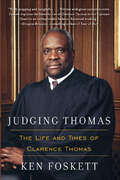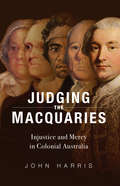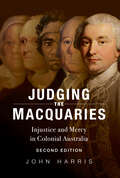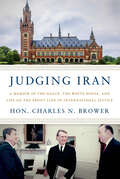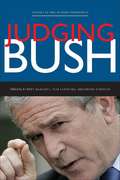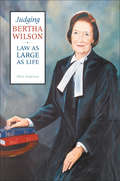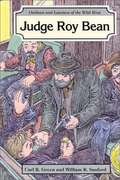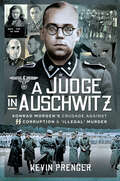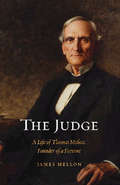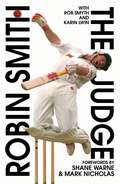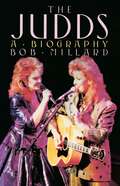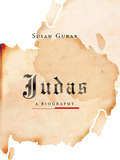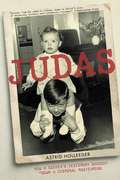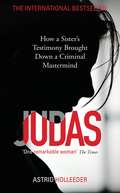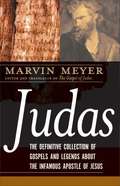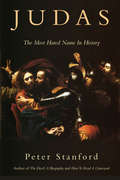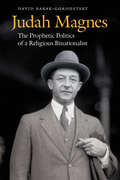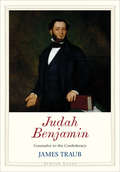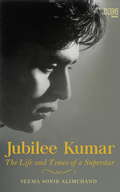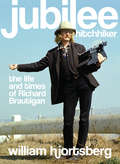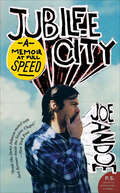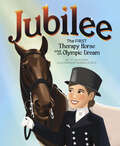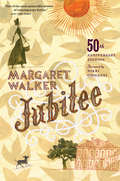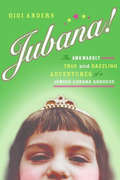- Table View
- List View
Judging Thomas: The Life and Times of Clarence Thomas
by Ken FoskettClarence Thomas, the youngest and most controversial member of the Supreme Court, could become the longest-serving justice in history, influencing American law for decades to come. Who is this enigmatic man? And what does he believe in?Judging Thomas tells the remarkable story of Clarence Thomas's improbable journey from hardscrabble beginnings in the segregated South to the loftiest court in the land. With objectivity and balance, author Ken Foskett chronicles Thomas's contempt for upper-crust blacks who snubbed his uneducated, working-class roots; his flirtation with the priesthood and, later, Black Power; the resentment that fueled his opposition to affirmative action; the conservative beliefs that ultimately led him to the Supreme Court steps; and the inner resilience that propelled him through the doors.Based on interviews with Thomas himself, fellow justices, family members, and hundreds of friends and associates, Judging Thomas skillfully unravels perhaps the most complex, controversial, and powerful public figure in America today.
Judging the Macquaries: Injustice and Mercy in Colonial Australia
by John HarrisThe Black Lives Matter movement is bringing the characters of powerful people in colonial times into sharp focus, particularly their attitudes and actions towards slavery and indigenous peoples. Lachlan and Elizabeth Macquarie are among those being scrutinised and reassessed. They arrived at the penal colony of NSW, a remote outpost of the British empire in 1809. The European invaders had barely survived two decades in an alien environment but, for countless millennia, home to its Aboriginal inhabitants. Lachlan was the new governor. Elizabeth, his wife, was his closest friend and fiercest supporter.The colony was an unruly mix of convicts, soldiers and settlers. At the time, Lachlan Macquarie’s leadership was judged by his handling of the convicts. Lachlan and Elizabeth treated the convicts humanely, forgiving them and restoring them to society. His superiors considered him far too lenient, yet to Sydneysiders, as ‘The Father of Australia’, he had gifted them the path to a prosperous future.Today, Lachlan is being judged by his treatment of Aboriginal people. The Macquaries thought they were being kind, yet they ignored the injustice of dispossession. Aboriginal people were British citizens under the protection of British law – a law they were expected to obey. Although known for his humanity, Lachlan had a fatal flaw. When hostilities broke out between Aborigines and settlers on the outskirts of the colony, he took the fateful decision to send in the military. This will never be forgotten, yet his sins were the sins of the empire he tried so hard to serve.Award-winning author and historian John Harris never baulks at handling controversial subjects. In this timely book, he tackles the disputes that marked Lachlan Macquarie’s period as governor and the complex controversies which still surround his actions today.
Judging the Macquaries: Injustice and Mercy in Colonial Australia
by John HarrisThe Black Lives Matter movement is bringing the characters of powerful people in colonial times into sharp focus, particularly their attitudes and actions towards slavery and indigenous peoples. Lachlan and Elizabeth Macquarie are among those being scrutinised and reassessed. They arrived at the penal colony of NSW, a remote outpost of the British empire in 1809. The European invaders had barely survived two decades in an alien environment but, for countless millennia, home to its Aboriginal inhabitants. Lachlan was the new governor. Elizabeth, his wife, was his closest friend and fiercest supporter.The colony was an unruly mix of convicts, soldiers and settlers. At the time, Lachlan Macquarie’s leadership was judged by his handling of the convicts. Lachlan and Elizabeth treated the convicts humanely, forgiving them and restoring them to society. His superiors considered him far too lenient, yet to Sydneysiders, as ‘The Father of Australia’, he had gifted them the path to a prosperous future.Today, Lachlan is being judged by his treatment of Aboriginal people. The Macquaries thought they were being kind, yet they ignored the injustice of dispossession. Aboriginal people were British citizens under the protection of British law – a law they were expected to obey. Although known for his humanity, Lachlan had a fatal flaw. When hostilities broke out between Aborigines and settlers on the outskirts of the colony, he took the fateful decision to send in the military. This will never be forgotten, yet his sins were the sins of the empire he tried so hard to serve.Award-winning author and historian John Harris never baulks at handling controversial subjects. In this timely book, he tackles the disputes that marked Lachlan Macquarie’s period as governor and the complex controversies which still surround his actions today.
Judging Iran: A Memoir of The Hague, The White House, and Life on the Front Line of International Justice
by Hon. Charles N. BrowerFrom a divided Berlin to The Hague, the Reagan White House, the forests of Costa Rica, and more, Judge Charles N. Brower shares a personal history of a life spent at the forefront of international justice— and a case for the role of law in preserving global peace.A judge of the Iran– United States Claims Tribunal for four decades, Charles N. Brower is aninternationally recognized leader in arbitration and has handled cases on six continents. With quick wit and a keen eye for adventure, he takes readers on a tour of his extraordinary career.As a young lawyer fresh from Harvard, Brower quickly made partner at a Wall Streetfirm. After just four months, however, he left the expected path to join the U.S. State Department, embarking on a career that put him in the thick of Cold War Europe and led to a lifelong focus on international law.Brower' s drive carried him to the heart of pressing issues, including globalization, governmental ethics, environmentalism, and human rights. At each stop, Brower encountered criminals and victims, advocates and miscreants, especially at the Iran– United States Claims Tribunal, where heated disagreements between judges once erupted into physical violence. His work at The Hague was interrupted only by his time as an advisor to President Ronald Reagan at the height of the Iran– Contra scandal, and Brower eventually became the most-appointed American judge ad hoc of the International Court of Justice.Judging Iran is a frank insider account of the highest echelons of international law. As an active judge to this day, Brower offers a nuanced history of modern arbitration between nations, from our earliest concept of international law to today' s efforts for justice. And, as a global citizen, he argues that the law is essential in our work for peace.
Judging Bush
by Robert Maranto Tom Lansford Jeremy JohnsonThere is no shortage of opinions on the legacy that George W. Bush will leave as 43rd President of the United States. Recognizing that Bush the Younger has been variously described as dimwitted, opportunistic, innovative, and bold, it would be presumptuous to draw any hard and fast conclusions about how history will view him. Nevertheless, it is well within academia's ability to begin to make preliminary judgments by weighing the evidence we do have and testing assumptions. In the wake of the September 11 terrorist attacks and the initially successful military campaign in Afghanistan, Bush and his administration enjoyed nearly unprecedented popularity. But after failures in Iraq and in the federal government's response to Hurricane Katrina, Bush's approval ratings plummeted. Guided by a new framework,Judging Bushboldly takes steps to evaluate the highs and lows of the Bush legacy according to four types of competence: strategic, political, tactical, and moral. It offers a first look at the man, his domestic and foreign policies, and the executive office's relationship to the legislative and judicial branches from a distinguished and ideologically diverse set of award-winning political scientists and White House veterans. Topics include Bush's decision-making style, the management of the executive branch, the role and influence of Dick Cheney, elections and party realignment, the Bush economy, Hurricane Katrina, No Child Left Behind, and competing treatments of the wars in Iraq and Afghanistan. Contributors include Lara M. Brown, David B. Cohen, Jeffrey E. Cohen, Laura Conley, Jack Covarrubias, John J. DiIulio, Jr. , William A. Galston, Frederick M. Hess, Karen M. Hult, Lori A. Johnson, Robert G. Kaufman, Anne M. Khademian, Lawrence J. Korb, Patrick McGuinn, Michael Moreland, Costas Panagopoulos, James P. Pfiffner, Richard E. Redding, Neil Reedy, Andrew Rudalevige, Charles E. Walcott, and Shirley Anne Warshaw.
Judging Bertha Wilson
by Ellen AndersonMadame Justice Bertha Wilson, the first woman appointed to the Supreme Court of Canada, is an enormously influential and controversial figure in Canadian legal and political history. This engaging, authorized, intellectual biography draws on interviews conducted under the auspices of the Osgoode Society for Legal History, held in Scotland and Canada with Madame Justice Wilson, as well as with her friends, relatives, and colleagues. The biography traces Wilson's story from her birth in Scotland in 1923 to the present. Wilson's contributions to the areas of human rights law and equality jurisprudence are many and well-known. Lesser known are her early days in Scotland and her work as a minister's wife or her post-judicial work on gender equality for the Canadian Bar Association and her contributions to the Royal Commission on Aboriginal Peoples.Through a scrupulous survey of Wilson's judgements, memos, and academic writings (many as yet unpublished), Ellen Anderson shows how Wilson's life and the law were seamlessly integrated in her persistent commitment to a stance of principled contextuality. This stance has had an enduring effect on the evolution of Canadian law and cultural history. Supported with the warmth and generosity of Wilson's numerous personal anecdotes, this work illuminates the life and throught of a woman who has left an extraordinary mark on Canada's legal landscape.
Judge Roy Bean (Outlaws and Lawmen of the Wild West)
by Carl R. Green William R. Sanford- Biographies of famous and infamous men of the Western frontier. - Entices the reluctant reader to relive the exciting days of the Wild West.
A Judge in Auschwitz: Konrad Morgen's Crusade Against SS Corruption & 'Illegal' Murder
by Kevin PrengerIn autumn 1943, SS judge Konrad Morgen visited Auschwitz concentration camp to investigate an intercepted parcel containing gold sent from the camp. While there Morgen found the SS camp guards engaged in widespread theft and corruption. Worse, Morgen also discovered that inmates were being killed without authority from the SS leadership. While millions of Jews were being exterminated under the Final Solution programme , Konrad Morgen set about gathering evidence of these ‘illegal murders’. Morgen also visited other camps such as Buchenwald where he had the notorious camp commandant Karl Koch and Ilse, his sadistic spouse, arrested and charged. Found guilty by an SS court, Koch was sentenced to death. Remarkably, the apparently fearless SS judge also tried to prosecute other Nazi criminals including Waffen-SS commanders Oskar Dirlewanger and Hermann Fegelein and Auschwitz Commandant Rudolf Höss. He even claimed to have tried to indict Adolf Eichmann, who was responsible for organising the mass deportation of the Jews to the extermination camps. This intriguing work reveals how the lines between justice and injustice became blurred in the Third Reich. As well as describing the actions of this often contradictory character the author questions Morgen’s motives.
The Judge: A Life of Thomas Mellon, Founder of a Fortune
by James MellonLawyer, judge, banker, classics professor, and councilman, Thomas Mellon greatly influenced the fortunes of his hometown, Pittsburgh, throughout the nineteenth century. In the process, he became one of the city's most important business leaders, and he laid the foundation for a family that would contribute considerably to the city's growth and welfare for much of the next hundred years, becoming one of the world's most recognizable names in industry, innovation, and philanthropy. Through his in-depth examination of the extensive Mellon family archives, in The Judge James Mellon--a direct descendent of Thomas Mellon--has fashioned an incisive portrait of the elder Mellon that presents the man in full. Offering a singular and insightful characterization of the Scotch-Irish value system that governed the patriarch's work and life, James Mellon captures the judge's complexities and contradictions, revealing him as a truly human figure. Among the recent biographies of Pittsburgh's famous businessmen, The Judge stands apart from the pack because of the author's unique perspective and his objective and scholarly approach to his subject.
The Judge: More Than Just a Game
by Robin Smith Rob Smyth* SHORTLISTED FOR THE TELEGRAPH SPORTS BOOK AWARDS *Robin Smith was one of England's most popular cricketers of the 1990s. The Judge, as he was known to all, took on some of the most dangerous fast bowlers of all time with a skill and fearlessness that ensured hero status. His savage square cut drew roars of approval from fans all around the world, especially those of his beloved England and Hampshire. But when he was prematurely dumped from the England set-up at the age of 32, he had to face his toughest opponent of all - himself. Smith suffered a debilitating loss of identity, especially when he retired from professional cricket in 2003, and struggled to deal with the contradictions in his personality. Was he the Judge, the fearless warrior, or Robin Smith, the frantic worrier? Without a support structure to transition from cricket to the outside world, Smith suffered from mental health, alcohol, marital and financial problems until he hit rock bottom and planned to take his own life. In The Judge - More than Just a Game, he revisits his experience of extreme darkness and challenges received wisdom about masculinity and mental health. He also shares the many highs and lows of his eventful international and county career, including his exhilarating battles with the West Indies and his struggles against mystery spin. And he reflects fondly on a time when cricketers worked hard and partied even harder; a time almost unrecognisable to the modern day.
The Judds: A Biography
by Bob MillardMillard presents a fascinating, honest, and in-depth look at Naomi and Wynonna Judd--country music's most beloved mother and daughter duo--which tells of their early years of struggle, their seven-year musical career, and the heart-rending tragedy which forced Naomi to retire. Exclusive update on Naomi's illness and the pair's phenomenal farewell tour. 8 pages of photographs.
Judas: A Biography
by Susan Gubar"Judas is a dark journey through the murderousness of Christian Anti-Semitism, culminating in the mass slaughter of more than a and their associated European butchers. Lucid, study is close to definitive on the fictive figure of Judas."--Harold Bloom
Judas: How a Sister's Testimony Brought Down a Criminal Mastermind
by Astrid HolleederThe incredible true story of a woman who risked everything to put her brother, a murderous psychopath and one of the world's most infamous crime bosses, behind bars.Astrid Holleeder is in hiding because she had the courage to write this book. Her brother Willem Holleeder, best known for his involvement in the 1983 kidnapping of the CEO and chairman of Heineken brewing company, is one of the most notorious criminals in contemporary history. For decades, Wim ruled over his family mafia-style, threatening death if any of them betrayed him. Astrid and her sister, Sonja, watched as their brother eliminated anyone who got in his way, and they lived in terror of inciting his rage, unable to protect even their own young children from his violence. Trained as a lawyer, Astrid served as her brother's unwilling confidante. Now, she's turning the tables on him. Charged for his involvement in multiple assassinations, including that of his former partner and brother-in-law, Holleeder is finally on trial for murder, all due to the shocking testimony of his own family. An international bestseller that has sold more than 500,000 copies in Holland, this stunning, edge-of-your seat memoir chronicles Astrid's terrifying experience working as a double agent, preserving her brother's trust just so that she could get enough information to put him away for life. Judas is the intimate account of Astrid's deeply personal betrayal, set against the backdrop of their haunting family history and the astonishing world of the criminal underground.
Judas: How a Sister's Testimony Brought Down a Criminal Mastermind
by Astrid HolleederWillem Holleeder is one of the most notorious criminals in contemporary history. Best known for his involvement in the 1983 kidnapping of Alfred Heineken, CEO and Chairman of Heineken, and his infamous 2006 trial in which he was convicted of extortion, money laundering and membership of a criminal organization, Willem Holleeder captured the attention of the world. What few knew was how Willem had terrorized, extorted and threatened his family for thirty years, just as his alcoholic father - an employee at Heineken - had dominated and mistreated the family for years. Children, sisters, women, in-laws and mother: no one escaped the despotic behaviour of father and son.But Willem's latest conviction is quickly becoming the trial of the century. Charged for his involvement in multiple assassinations, including that of his former partner and brother-in-law, Willem is finally being put on trial for murder, all due to the shocking and incriminating testimony of his own family. Having spent years as his unwilling consigliere, Willem's own sister Astrid is finally breaking her silence and going on the record. In this stunning memoir, Astrid finally reveals decades of familial manipulation and fear and her own thrilling experience working as a double cross, preserving enough trust to attain the information that would convict her brother for life.
Judas
by Marvin MeyerJudas Iscariot has been demonized as the quintessential traitor, the disciple who betrayed his master for the infamous thirty pieces of silver. But the recent sensational discovery and publication of the long lost Gospel of Judas, with its remarkable portrayal of Judas Iscariot as the disciple closest to Jesus, raises serious new questions. Was Judas the only member of the Twelve who truly understood Jesus? Did Jesus secretly collaborate with Judas to set in motion the series of events that would redeem all of humankind? In search of answers, Marvin Meyer, one of the world's leading experts on the Gospel of Judas presents a collection of the earliest accounts of Judas, which together paint a fuller portrait of this most enigmatic disciple. This book presents the essential texts that deal with the figure of Judas, including New Testament writings, Gnostic documents, and other early and later Christian literature. These are the earliest known testimonies about Judas and include selections from the gospels of Mark, Matthew, Luke, and John, the Acts of the Apostles, and relevant passages from Paul. The centerpiece of the book is the Gospel of Judas, followed by excerpts from three other Gnostic texts--the Dialogue of the Savior, the Concept of Our Great Power, and the "Round Dance of the Cross"--which may shed new light on the figure of Judas. A series of additional writings on Judas produced over the centuries provide glimpses of the vilification of Judas and the emergence of anti-Semitic themes. Meyer offers evidence of traitors before Judas--the Genesis story of Joseph's brothers who sold him into slavery, the duplicitous friend of the poet in Psalm 41, and Melanthius the goatherd in Homer's Odyssey--all of which raise the question of whether the story of Judas Iscariot could be simply a piece of religious fiction derived from earlier stories. Judas provides a rich collection of original sources that tell the story of Christianity's most infamous figure, offering the fullest understanding of Judas Iscariot's undeniable importance in the climax of Jesus's life.
Judas
by Marvin W. MeyerJudas Iscariot has been demonized as the quintessential traitor, the disciple who betrayed his master for the infamous thirty pieces of silver. But the recent sensational discovery and publication of the long lost Gospel of Judas, with its remarkable portrayal of Judas Iscariot as the disciple closest to Jesus, raises serious new questions. Was Judas the only member of the Twelve who truly understood Jesus? Did Jesus secretly collaborate with Judas to set in motion the series of events that would redeem all of humankind? In search of answers, Marvin Meyer, one of the world's leading experts on the Gospel of Judas presents a collection of the earliest accounts of Judas, which together paint a fuller portrait of this most enigmatic disciple.This book presents the essential texts that deal with the figure of Judas, including New Testament writings, Gnostic documents, and other early and later Christian literature. These are the earliest known testimonies about Judas and include selections from the gospels of Mark, Matthew, Luke, and John, the Acts of the Apostles, and relevant passages from Paul. The centerpiece of the book is the Gospel of Judas, followed by excerpts from three other Gnostic texts--the Dialogue of the Savior, the Concept of Our Great Power, and the "Round Dance of the Cross"--which may shed new light on the figure of Judas. A series of additional writings on Judas produced over the centuries provide glimpses of the vilification of Judas and the emergence of anti-Semitic themes.Meyer offers evidence of traitors before Judas--the Genesis story of Joseph's brothers who sold him into slavery, the duplicitous friend of the poet in Psalm 41, and Melanthius the goatherd in Homer's Odyssey--all of which raise the question of whether the story of Judas Iscariot could be simply a piece of religious fiction derived from earlier stories. Judas provides a rich collection of original sources that tell the story of Christianity's most infamous figure, offering the fullest understanding of Judas Iscariot's undeniable importance in the climax of Jesus's life.
Judas: The Most Hated Name In History
by Peter StanfordIn this fascinating historical and cultural biography, Peter Stanford deconstructs that most vilified of Bible characters: Judas Iscariot, who famously betrayed Jesus with a kiss. Beginning with the gospel accounts, Stanford explores two thousand years of cultural and theological history to investigate how the very name Judas came to be synonymous with betrayal and, ultimately, human evil. But as the author points out, there has long been a counter-current of thought that suggests that Judas might in fact have been victim of a terrible injustice: central to Jesus' mission was his death and resurrection, and for there to have been a death, there had to be a betrayal. This thankless role fell to Judas; should we in fact be grateful to him for his role in the divine drama of salvation? "You'll have to decide," as Bob Dylan sang in the sixties, "Whether Judas Iscariot had God on his side." An essential but doomed character in the Passion narrative, and thus the entire story of Christianity, Judas and the betrayal he symbolizes continue to play out in much larger cultural histories, speaking as he does to our deepest fears about friendship, betrayal, and the problem of evil. Judas: the ultimate traitor, or the ultimate scapegoat? This is a compelling portrait of Christianity's most troubling and mysterious character.
Judah Magnes: The Prophetic Politics of a Religious Binationalist
by David Barak-GorodetskyThis comprehensive intellectual biography of Judah Magnes—the Reform rabbi, American Zionist leader, and inaugural Hebrew University chancellor—offers novel analysis of how theology and politics intertwined to drive Magnes&’s writings and activism—especially his championing of a binational state—against all odds. Like a prophet unable to suppress his prophecy, Magnes could not resist a religious calling to take political action, whatever the cost. In Palestine no one understood his uniquely American pragmatism and insistence that a constitutional system was foundational for a just society. Jewish leaders regarded his prophetic politics as overly conciliatory and dangerous for negotiations. Magnes&’s central European allies in striving for a binational Palestine, including Martin Buber, credited him with restoring their faith in politics, but they ultimately retreated from binationalism to welcome the new State of Israel. In candidly portraying the complex Magnes as he understood himself, David Barak-Gorodetsky elucidates why Magnes persevered, despite evident lack of Arab interest, to advocate binationalism with Truman in May 1948 at the ultimate price of Jewish sovereignty. Accompanying Magnes on his long-misunderstood journey, we gain a unique broader perspective: on early peacemaking efforts in Israel/Palestine, the American Jewish role in the history of the state, binationalism as political theology, an American view of binationalism, and the charged realities of Israel today.
Judah Benjamin: Counselor to the Confederacy (Jewish Lives)
by James TraubA moral examination of one of the first Jewish senators, confidante to Jefferson Davis, and champion of the cause of slavery Judah P. Benjamin (1811–1884) was a brilliant and successful lawyer in New Orleans, and one of the first Jewish members of the U.S. Senate. He then served in the Confederacy as secretary of war and secretary of state, becoming the confidant and alter ego of Jefferson Davis. In this new biography, author James Traub grapples with the difficult truth that Benjamin, who was considered one of the greatest legal minds in the United States, was a slave owner who deployed his oratorical skills in defense of slavery. How could a man as gifted as Benjamin, knowing that virtually all serious thinkers outside the American South regarded slavery as the most abhorrent of practices, not see that he was complicit with evil? This biography makes a serious moral argument both about Jews who assimilated to Southern society by embracing slave culture and about Benjamin himself, a man of great resourcefulness and resilience who would not, or could not, question the practice on which his own success, and that of the South, was founded.
Jubilee Kumar: The Life and Times of a Superstar
by Seema Sonik AlimchandKnown to generations of cinema-lovers as the evergreen hero of blockbuster hits like Dil Ek Mandir, Ayee Milan ki Bela, Arzoo and Sangam, Rajendra Kumar Tuli was truly the ‘Jubilee Star’ of Hindi cinema in the 1960s. Jubilee Kumar is the so-far-untold story of the man behind the superstar – one who went from riches to rags early in life, but whose determination, prudence and humility saw him surmount countless hurdles, and win the affection and admiration of colleagues and fans alike.A dispossessed refugee following Partition, Kumar’s struggles intensified as he travelled from Sialkot to Bombay to try his luck in films, suffering homelessness and hunger before he got a break as an assistant director. Overcoming both prejudice in the industry and his own insecurities, he eventually rose to unimaginable fame and popularity as a leading man in films and a respected producer.Touching candidly upon his life both on-screen and off it, this intimate account reveals Kumar – often through his own reminiscences and the recollections of others – as a hard-headed businessman, a generous and empathetic senior colleague, a gallant co-star to his female leads, a good-natured rival to peers and, above all, an upright and principled family man who rose above the many temptations of life in the Indian film industry.A riveting tale of struggle and stardom, fame and disillusionment, love, heartbreak and loss, Jubilee Kumar unwraps the many layers of an icon whose achievements and charisma few of his rivals or successors have been able to match.
Jubilee Hitchhiker: The Life and Times of Richard Brautigan
by William HjortsbergConfident and robust, Jubilee Hitchhiker is an comprehensive biography of late novelist and poet Richard Brautigan, author of Troutfishing in America and A Confederate General from Big Sur, among many others. When Brautigan took his own life in September of 1984 his close friends and network of artists and writers were devastated though not entirely surprised. To many, Brautigan was shrouded in enigma, erratic and unpredictable in his habits and presentation. But his career was formidable, an inspiration to young writers like Hjortsberg trying to get their start. Brautigan's career wove its way through both the Beat-influenced San Francisco Renaissance in the 1950s and the "Flower Power" hippie movement of the 1960s; while he never claimed direct artistic involvement with either period, Jubilee Hitchhiker also delves deeply into the spirited times in which he lived.As Hjortsberg guides us through his search to uncover Brautigan as a man the reader is pulled deeply into the writer's world. Ultimately this is a work that seeks to connect the Brautigan known to his fans with the man who ended his life so abruptly in 1984 while revealing the close ties between his writing and the actual events of his life. Part history, part biography, and part memoir this etches the portrait of a man destroyed by his genius.
Jubilee City: A Memoir at Full Speed
by Joe AndoeJoe Andoe is an internationally exhibited painter. His work, hailed by The New Yorker as "cowboy noir with a fashionista twist," is in the collections of the Museum of Fine Arts in Boston, the Whitney Museum of Art in New York, and countless other locations. He is a father. He is a writer. He is sober. That's now.Once upon a time, though, way back in the '70s, Joe Andoe was a delinquent bad boy growing up wild in Tulsa, Oklahoma—drinking, drugging, and driving too fast down a dead-end road. He was one car crash, one overdose away from head-on disaster. His art saved him.A life story told in discrete, arresting snapshots of despair, resilience, creativity, and hope, Joe Andoe's raw, vivid, and utterly original memoir is as striking as his painting. With echoes of Jim Carroll poetic insight and Charles Bukowski grit, yet still uniquely the artist's own, Andoe's literary portrait of his time to date on earth is as powerful as a heavyweight's hook and as spellbinding as a major crack-up on the opposite side of the highway. It is an important work of curiosity and grandiosity; a testament to a young man's resilience and genius and luck that enabled him to survive a life lived wildly out of control; an unparalleled adventure, a rocket ride from the sordid depths of self-destruction to the glorious pinnacles of…Jubilee City
Jubilee: The First Therapy Horse and an Olympic Dream
by KT JohnstonLis Hartel became paralyzed after contracting polio in 1944. Her dreams of riding horses and competing in the sport of dressage were shattered. After months in the hospital, doctors told her she’d never ride again. Lis tried anyway. How do you stay on a horse without using your legs? How do you give the subtle cues needed in dressage with limited mobility? With hard work—and an unlikely horse named Jubilee. After years of training together and creating a new way of communicating, Lis and Jubilee danced into the competition ring, and eventually all the way to the Olympics. Lis Hartel was the first woman with a disability ever to win an Olympic medal, and the first woman to stand equally beside men on the Olympic winners' podium in any sport.
Jubilee: And Other Essays On Life And Literature
by Margaret WalkerThe bestselling classic about a mixed-race child in the Civil War-era South that &“chronicles the triumph of a free spirit over many kinds of bondage&” (TheNew York Times Book Review). Jubilee tells the true story of Vyry, the child of a white plantation owner and his black mistress. Vyry bears witness to the antebellum South in both its opulence and its brutality, its wartime ruin, and the promises of Reconstruction. Weaving her own family&’s oral history with thirty years of research, Margaret Walker brings the everyday experiences of slaves to light in a novel that churns with the hunger, the hymns, the struggles, and the very breath of American history. &“A revelation.&”—Milwaukee Journal Includes a foreword by Nikki Giovanni
Jubana!
by Gigi AndersAccording to her colorful Mami Dearest, the life of young Gigi Anders will be simple if she can remember three maxims--be pretty, get married, and always drink TaB. Thus begins her instruction in the art of being a lady and the side effects of falling in love. As the granddaughter of Eastern European and Russian shtetl-reared grandparents who immigrated as teenagers in the early 1920s to the fierce tropical beauty of Cuba, Anders is heir apparent to a legacy of transatlantic alienation. With dazzling wit and hilarity mined from the depths of loss and yearning, Anders chronicles her journey from beach baby to ostracized exile to vibrant intellectual, along the way balancing her obsession with killer outfits and zaftig, orgasmic meals--always with a can of TaB!--with the more serious pursuits of love, sanity, and lipstick in perfect siren red.
